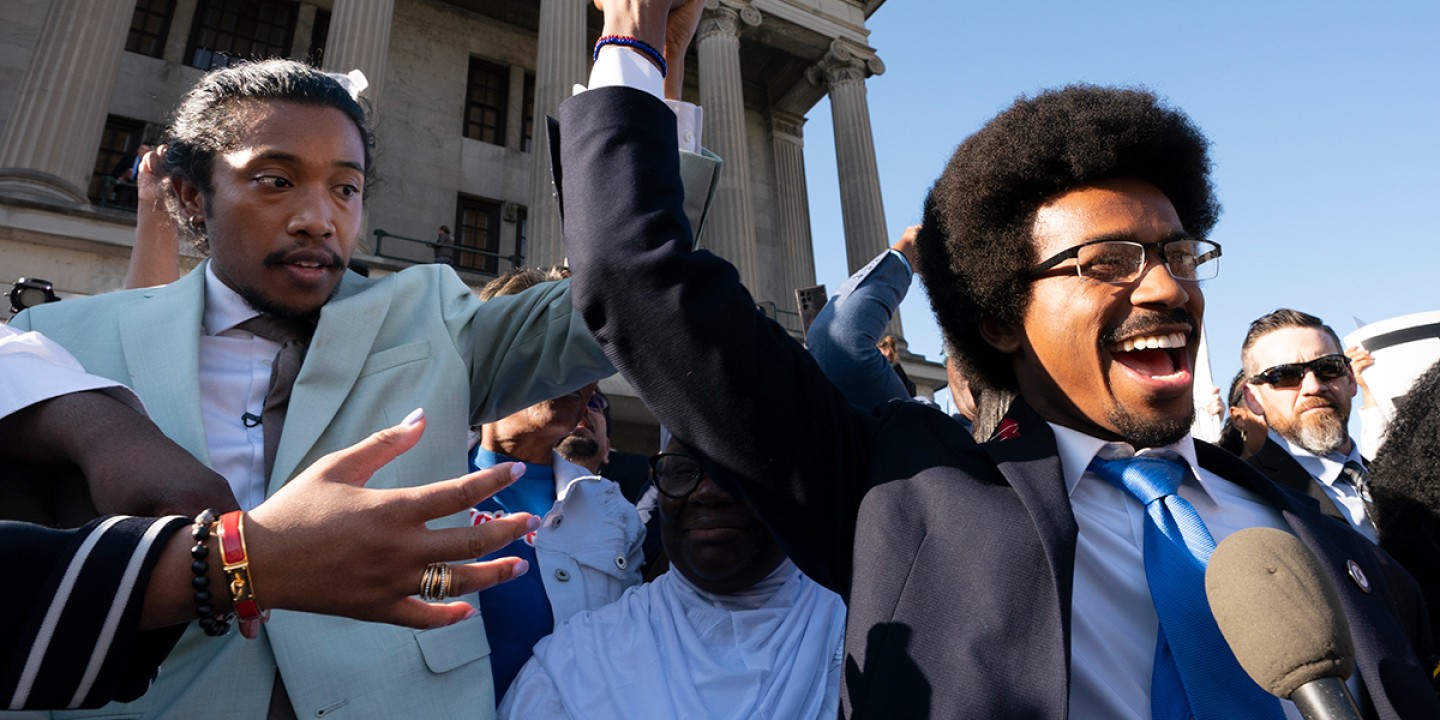The duly elected Black men expelled from a state legislature—155 years ago
The expulsion of Justin Jones and Justin Pearson recalls the Original 33, expelled by Georgia’s anti-Reconstruction White majority in 1868.

When Justin Jones and Justin Pearson, two young Black members of the Tennessee General Assembly, stood before their colleagues after a shooter took the lives of three students and three staff members at the Covenant School in Nashville, they were keenly aware that their views on gun reform were in a small minority among more conservative lawmakers, who continue to advocate expansion of gun access.
What they likely hadn’t expected was that daring to voice a differing opinion in the wake of yet more killings would result in their expulsion from the legislature.
The expulsion, in which a conservative majority voted to oust the two lawmakers, followed Jones and Pearson speaking in support of students who had come to the capitol to plead for lawmakers to reconsider gun reform measures. The majority fell one vote short of expelling a third lawmaker, who is White and who also joined in supporting the students.
Read our latest issue or browse back issues.
While the Metropolitan Nashville Council quickly voted to return Jones to his seat, and in Memphis, the Shelby County Board of Commissioners did the same for Pearson two days later, their expulsions still force the pair to face special elections in the fall. And while questions about the vote to expel the two lawmakers have generated much-needed conversation, discourse about weapons is desperately needed as well and needs now to be reenergized.
The expulsion of Jones and Pearson is not the first such expulsion in history. It calls to mind the expulsion of the Original 33—the first Black legislators elected in Georgia—155 years earlier. Examining the precedent can tell us a lot about our cultural moment.
In 1868, the hope of Reconstruction was still lingering in the air: the second of the three so-called Reconstruction Amendments to the Constitution was making its way through the states’ ratification processes. The 13th Amendment had been ratified on December 6, 1865—officially granting freedom to all people who had been enslaved in the United States. On July 9, 1868, the 14th Amendment was ratified, granting citizenship to formerly enslaved people and requiring that no state deprive citizens of due process and equal protection under the law.
Unsurprisingly, among the first states to elect Black lawmakers were those in which formerly enslaved Black people continued to be populous: southern states including Mississippi, South Carolina, Florida, Georgia, and Alabama. In Georgia, 33 Black men, all part of the state’s Republican (pro-Reconstruction) minority, were elected to the state assembly in 1868. The Original 33—as the group came to be known—included 24 men said to be ministers, most notably Henry McNeal Turner, a minister in the African Methodist Episcopal tradition who would be an outspoken advocate for the rights of Black people and in opposition to segregation.
While the Original 33 were duly elected to serve, in September 1868 they were expelled by the legislature’s Democratic (anti-Reconstruction) majority. On September 19, one of the expelled representatives, Philip Joiner, announced a march from Albany, Georgia, to the Mitchell County Courthouse in Camilla, in protest of the expulsion. But the group of about 300 men was met with violence from White Mitchell County residents when they reached Camilla. It was reported that 15 of the marchers were killed and dozens injured in the attack.
The names of the Original 33 are inscribed on a sculpture dedicated to them at the Georgia State House: Thomas A. Allen, Eli Barnes, Thomas Beard, Edwin Belcher, Malcolm Claiborn, Tunis Campbell Jr., George H. Clower, Abram Colby, John T. Costin, Madison Davis, Monday Floyd, F. H. Fyall, Samuel Gardner, William A. Golden, William Guilford, William Henry Harrison, Ulysses L. Houston, Philip Joiner, George Linder, Robert Lumpkin, Romulus Moore, Peter O’Neil, James Ward Porter, Alfred Richardson, James M. Simms, Abraham Smith, Alexander Stone, Henry McNeal Turner, John Warren, and Samuel Williams, Aaron Alpeoria Bradley, Tunis Campbell Sr., and George Wallace.
Although the Original 33 were ultimately reinstated to the Georgia state legislature, none of them went on to be reelected. The voting franchise was key to ensuring representation in local, state, and federal government; the 15th Amendment, granting Black men the right to vote, was not ratified until 1870—and already, Black people were often threatened if they chose to try to exercise that right. After the Camilla attack, there were increased reports of intimidation of and threats against Black Georgia voters; this resulted in fewer Black people even attempting to vote.
The fate of the Original 33 was a harbinger of what was to come: the hope and promise of Reconstruction quickly faded, replaced by violence and lynchings, Black Codes and Jim Crow laws, and renewed calls for segregation and separation. We proved, in our human condition, that seeing the image of God in one another and loving neighbors as ourselves was an overwhelming challenge.
What went wrong then? What is still going wrong now?
In Genesis, a brother violently kills a brother in a jealous rage; a father heeds an angry wife’s request to remove his firstborn son and his mother from the family home, leaving them without provisions in the wilderness; a brother cheats his father and his older brother by stealing his brother’s birthright and blessing; brothers who have become more than tired of a younger brother who is his father’s favorite sell him into bondage for a few pieces of silver. Throughout Genesis, there is a silencing of voices of those imagined to be other.
If we always view neighbors as other and as threats, then it certainly becomes easier to convince ourselves that the only path forward is eliminating their voices from the conversation. But then we become an echo chamber, and we miss the experience of the unique gifts of neighbors that make a difference in the world.
Turns out, Cain and Abel were rather perfect partners in the garden, where one thrived tending the soil and the other tending the flocks. Turns out, God planned to keep covenant with Ishmael and Isaac, in spite of their parents’ disagreements—and each had his own set of gifts. Turns out, Jacob and Esau had complementary gifts that could have benefited each other and their family if jealousy hadn’t driven the brothers apart. Turns out, Joseph knew how to plan for the future and could help entire nations—if his brothers just could have seen past their own jealousy and anger.
What if we who are made in the image and likeness of God truly learned to see the image of the Creator in one another and to find strength and wisdom in our tapestry of diversity? We might then ask how our communities and leaders can protect and serve the interests of all of God’s people. And we might come to value each other’s perspectives enough to avoid expelling each other from the table.





